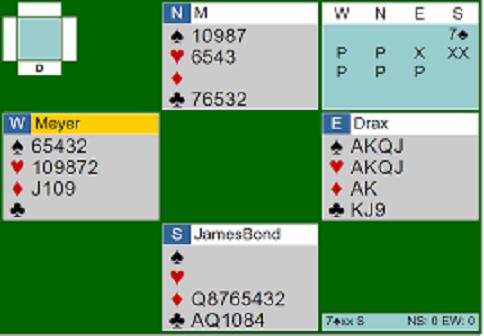Yes, sacred transport, even sacred ping pong. But can a card game have a spiritual grounding?*
There's no question in my mind that bridge is the king of card games. It pushes the mind to the limit.
Each hand requires that all four players, two pairs, keep in mind all 52 cards, plan their cooperative strategy, then execute it, all the time adjusting to the vagaries of the other pair, not to mention your partner. The only reprieve is for the declarer's partner during the play, his 'dummy' (sic).
Rules of the game
The two sides are the offense/ declarer vs the defense. But in reality both sides are offense, trying to get as many tricks as possible.
NoTrump (NT) puts the declarer in the position of defending his little collection of winners and trying to add enough extra ones from all four suits to make his contract. The rule of play: in NT count your winners, then figure out how to go from, say, 3 solid winners to 7+ tricks (out of 13).
If you play a Suit contract, declarer really is the attacker, out to destroy the defenders, obliterate their tricks through trickery (sic). The rule of play: in a Suit contract, count your losers and look for how to create a void and use your magic bullet trump cards to make your 7+ tricks, depending on the contract.
NT is the classiest contract, requiring declarer to really, really keep track of not just one suit, but of all four. It is hardest to bid, as you can't always make sure all four suits are adequately stopped, leading to a potential disaster through bad bidding and/or bad play.
That's why 3NT (9 tricks) is game, but 4Spades /Hearts (10 tricks) and 5Clubs/Diamonds (11 tricks) are required for game.
My favourite is 1NT. It's a head-spinning contract, as you probably only have half the total 40 points and no 8-card suit, which is vital to ensure a solid run of tricks. It usually takes longer, and whoever has a key card (which you can only intuit at the start and during play), and keeps it for the key moment (often the last trick), can reverse the contract, letting defenders make the declarer's 1NT.
1NT is like the declarer gets away with a 'cheap' contract, e.g., a bicycle ride vs a car ride. But if if defenders defeat it, it's like the defense manages to steal the bike from under declarer's nose and ride it in the opposite direction. It's my favourite contract, either as defense or declarer. Everyone has a good laugh, and not much harm is done. No one gets killed by a cyclist.
3NT is like driving a nice compact car that the others let you drive, and you promise to drive at the speed limit (everything is rational and legal), dodging all the traffic and getting home without any mishap.

A Suit contract is the opposite. It delights in trickery from the get-go. You want an extreme hand, say 7 clubs, just a few of the other suits. Best of all a void. That's like ace-king-queen in a Suit contract. So point count (ace 4, king 3, queen 2, jack 1) is secondary to distribution (7, 0, 2, 5).
You can 'preempt' the others by opening the bidding at 3Clubs or even 4Clubs. Or 7Clubs as in the famous James Bond bridge hand above. That's like bragging 'I can go 150 kph in Clubs, give the cops the finger and get away with it.'
Bidding and making a small or grand slam is a flight in a hand glider, cruising aloft on brain power alone. A rarity and a joy.

7 NT Grand Slam
Play is fraught. Finding the killer opening lead (based on careful reading of bidding, body language).
There are a few magic rituals besides the ironclad rules above on NT counting winners vs Suit contract losers.
*The opening lead in NT (and a default opening lead in a Suit contract) should be 4th from your longest and strongest suit.
*The corollary Rule of 11. Say my best suit is clubs (king, jack, 10, 6, 4), so I lead the 6. 11 - 6 = 5. There are 5 cards higher than the 6 in the other 3 hands. And that works for all three hidden hands! No one knows why. It's like the square root of minus one. Or x/0 = infinity.
NT is civilization. Gentile, logical, covering all the suits equally. Justice is served to the best team planners-executer. A ride in a limo. A Suit contract is like a hotrod race. A brash declarer could be stealing a nice logical contract from the opponents, betting on them to make mistakes, wagering on chaos and force, but risking disaster if even one card not there or misplayed. Ruthless and slightly irrational. The jungle.
To stretch the metaphor, NT is marriage, a Suit contract akin to rape or at least machismo.
Bridge pushes the mind to use reason, but also to take into account chance, the unknowable, your own, partner's and opponents' psychology. Good intuition and instincts are essential.
But it is a dangerous game. Like all entertainment, it can be addictive. And it is very competitive. The extreme form of bridge is duplicate, where you play the same 20 hands with, say, 20 other pairs, and then compare the results. I love the idea of duplicate, but I gave it up, as I saw how it poisoned my character. You are so happy to put the others down, so full of pride when you make a difficult contract. Then you gossip about the others, make fun of them afterwards.
The devil is in the entertainment
Life is too short to spend more than a few hours a week at any entertainment. In old age (but not only), many people will play 3-5 times a week (10+ hours) and think about bridge and do puzzles another 10 hours, basically frittering away those precious hours of consciousness.
Of course, that's better than 20 hours of mindless TV, or 20 hours of pointless travel/ commuting, but where is the time for true spiritual quest? We are bombarded with mass entertainment in the West, eating up precious time without any redeeming value. Couch potatoes. Under the likes of Trump, falling into an Idiocracy. So many ways to plug into the Matrix and lose your life.
Duplicate bridge is the epitome of what I call negative bridge, which you can apply to any entertainment that makes you a worse human being. It brings out the worst in me.** It is more the devil at work than Eric striving to be a better person, closer to God. A sin, as indeed Christianity and Islam label all entertainment that has no spiritual grounding.
Bridge that is cooperative is much better, if less exciting. Just as cooperative ping pong (any sport) is better than vicious competitive ping pong. You have to self-regulate, allow whoever to correct an honest slip without exacting severe penalties as in duplicate. Rubber bridge is closer to this, but still highly competitive and often played for high stakes. I.e., gambling, which is very much a sin.
Our bridge group doesn't bother with scores, we allow for corrections, try to keep from descending into total anarchy, try to laugh at our foibles. It's still rocky, if someone is slow, constantly 'I think that... No... Maybe I should play that instead... What was the bidding again? Really? Hmm...'
Etiquette is de rigueur. It's always important to be considerate of others. Basic Golden Rule. Sadly that spiritual aspect is often missing, resulting in negative bridge.
---
*Playing cards and gambling are almost synonymous, so it's not surprising they are seen as the work of the devil. The standard 52-card deck was developed by the Mamlukes in 14th c Egypt, quite possibly by some bored sufi, conceived as a calendar year, as if foreshadowing the invention of bridge 6 centuries later: 365 spots/days, 52 cards/weeks, 13 tricks in a hand/fortnight, 12 face cards/months, 4 suits/seasons -- one 'hand'/year. All a coincidence? Bridge has other mysterious equations as we shall see. 1 deck/yr. An 18th c American folk song gives cards a Christian gloss.
**In my defense, bridge players are an eccentric lot, some gentile NTers and others crazy hotrodders, which makes etiquette all the more necessary.






